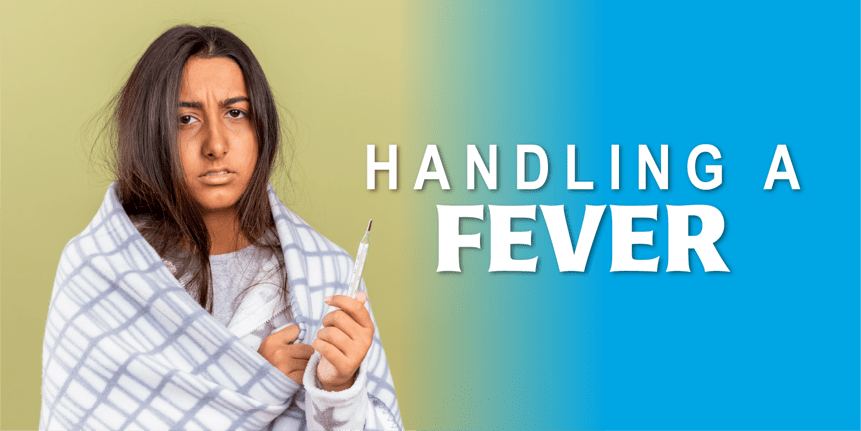How to Handle a Fever
- Category: Health Education, Primary Care
- Posted On:

When the body detects an illness, it responds by raising its temperature to fight it. This is known as a fever. Fevers fight various infections, bacteria and viruses.
There are symptoms that may prompt you to check your or your child's temperature. For adults these symptoms include sweating, chills, shivering, headache, muscles ache, dehydration, and general weakness. For children, symptoms may include dry mouth, earache, vomiting, poor appetite, pale appearance, skin rash, sore joints, sore throat, stomach pain, limpness, difficulty breathing, and whimpering. An infant may have high-pitched crying, fussiness and swelling of the soft spot on the head.
It's tempting to feel your or your child's forehead to check for a fever but know that this isn't a reliable method. Instead, use a thermometer meant for taking human temperatures.
There are three types of digital thermometers that can be used for accurate readings: multi-use, temporal and tympanic. The standard for fever varies based on age and how the temperature is taken.
When a child or adult has a low fever but can eat, drink, sleep and play normally, treatment may not be necessary. You can provide care at home by keeping yourself or your child comfortable.
- Dressing in light clothing. Offer a blanket if they have chills or are shivering.
- Make sure you or your child gets plenty of rest.
- Provide fluids, such as water and soups, to prevent dehydration. Ice pops and flavored gelatin can also help with hydration and sore throats.
- Use over-the-counter medication to help reduce the fever.
If your child has a fever that lasts more than 24 hours (for children under 2 years old) or 3 days (for children over 2 years old), contact your child's doctor. Also call if they still feel or act sick after the fever has subsided.
Seek emergency medical attention immediately if your child:
- Has a fever that rises above 104 degrees repeatedly.
- Is younger than 3 months old with a rectal temperature of 100.4 degrees or higher.
You should also seek medical attention if your child has a fever and:
- Additional symptoms, such as stiff neck, severe headache, severe sore throat, rash, nausea and vomiting.
- Behavior changes, such as being more tired or fussy than usual.
- A compromised immune system.
- Exposure to scorching temperatures, such as an overheated car.
- Seizures.
Adults should seek medical attention if their fever is 103 degrees or higher. Adults should seek immediate medical attention if their fever is accompanied by:
- Additional symptoms such as severe headache, rash, or persistent vomiting
- Sensitivity to light
- Stiff neck pain when you bend your head forward
- Confusion, strange behavior, altered speech
- Difficult breathing
- Abdominal pain
- Pain when urinating
- Convulsions or seizures.
If you have are feeling under the weather and need to see a physician for yourself or your family, visit lcmh.com/Find-A-Doc to explore our list of primary care physicians that are accepting new patients.
Lake Charles Memorial Health System is home to an extensive team of primary care physicians – both internal medicine and family medicine – located throughout Lake Charles, Moss Bluff and the surrounding areas. Are you looking for a “go-to” doctor for all your medical needs? If so, click here to learn more >>>
Sources: Familydoctor.org; Healthychildern.org; Mayo Clinic
Image Source: designed by stockking - Freepik.com




